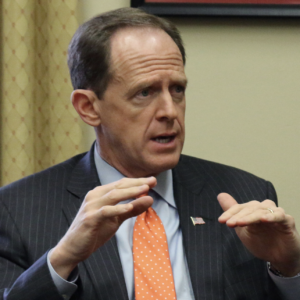A day after the U.S. House of Representatives acted to scotch a railroad workers’ strike, the Senate followed suit Thursday with an 80-15 vote of its own.
While several unions had approved a deal worked out by the Biden administration and the union leaders in September, a handful balked and threatened a strike. That could have crippled the U.S. economy just before Christmas.
On Monday, President Joe Biden called on Congress to act.
However, the Senate rejected an accompanying bill from the House that would have allowed seven days of paid sick leave for unionized workers.
Sen. Pat Toomey (R-Pa.) was one of several Republicans who voted for the sick leave provision, then joined five members of the Democratic caucus — Sens. Bernie Sanders (Vt.), an independent, as well as John Hickenlooper (Colo.), Kirsten Gillibrand (N.Y.), Elizabeth Warren (Mass.) and Ed Markey (Mass.) — in voting no to the strike measure.
“In an effort to prevent a strike, I voted to extend deliberations. Congress should not dictate terms nor intervene in these private negotiations,” Toomey said afterward. “In fact, it would be my preference that Congress would not play any role here.”
Sen. Bob Casey (D-Pa.) expressed his view on Twitter. “The tentative agreement brokered by President Biden and Secretary Walsh makes meaningful improvements in the lives of railway workers. It’s a good start, but it’s not enough.” Casey urged the Senate to insert the additional paid sick leave benefits.
Under the agreement wages will rise 24 percent by 2024, including an immediate 14 percent pay increase, giving rail workers an average salary of $110,000 a year.
Rail industry officials were pleased and relieved.
“The Senate acted with leadership and urgency with today’s vote to avert an economically devastating rail work stoppage,” said American Association of Railway President and CEO Ian Jefferies. “As we close out this long, challenging process, none of the parties achieved everything they advocated for. The product of these agreements is a compromise by nature, but the result is one of substantial gains for rail employees. More broadly, all rail stakeholders and the economy writ large now have certainty about the path forward.
“Let’s be clear railroading is tough, essential work that keeps our nation moving, and our employees deserve our gratitude for moving America’s freight and doing so safely every day. The gains in this agreement are significant, including historic wage increases, best-in-class healthcare, and meaningful progress in creating more predictable, scheduled work shifts. Without a doubt, there is more to be done to further address our employees’ work-life balance concerns, but it is clear this agreement maintains rail’s place among the best jobs in our nation.”
Please follow DVJournal on social media: Twitter@DVJournal or Facebook.com/DelawareValleyJournal

